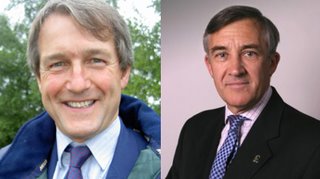 One view of American society, reflected by the British in our soooo superior way, is the dismissive comment on its local democracy, summed up by the sneer: "…but they even elect their dogcatchers".
One view of American society, reflected by the British in our soooo superior way, is the dismissive comment on its local democracy, summed up by the sneer: "…but they even elect their dogcatchers".Well, that may be the case, but to such pathetic levels of inadequacy has our so-called democratic system sunk that we now elect our dogs… or, at least, we might just as well, for all the power our elected local representatives have. Dogs, one has to say, have a use.
This is brought home to us by a news item in The Daily Telegraph, headlined: "Prescott's ethics fiasco hampering democracy", a commentary on a new report published by Owen Paterson, the shadow transport minister, and Gerald Howarth, the shadow defence minister.
 Entitled, "A question of standards", this records how an organisation called The Standards Board of England", with a staff of 219 and a budget of £10 million a year, is wreaking havoc with local councils, imposing a draconian and absurd code of practice which ends up banning councillors from discussing local park-and-ride schemes if they own a car or barred them from speaking or voting on the location of a mobile phone mast if they themselves used a mobile phone.
Entitled, "A question of standards", this records how an organisation called The Standards Board of England", with a staff of 219 and a budget of £10 million a year, is wreaking havoc with local councils, imposing a draconian and absurd code of practice which ends up banning councillors from discussing local park-and-ride schemes if they own a car or barred them from speaking or voting on the location of a mobile phone mast if they themselves used a mobile phone.Even councillors who have been elected specifically to fight a particular issue have fallen foul of the rules and found themselves told they cannot speak or vote on it.
The Standards Board for England, itself, was launched by deputy prime minister Prescott in 2001, who claimed that that the new body would help to ensure high ethical standards in local government. It supposedly handles complaints about councillors' behaviour and is supported by a network of ethical standards officers, who are each paid £61,000 a year. Each authority also has its own monitoring officers who advise councillors on their conduct.
In 2003-04 the board handled more than 3,500 allegations and launched 1,105 investigations. Sanctions were imposed on more than 200 councillors who were judged to have breached the code of conduct.
The net effect of the Board's activities, though, is to close down democratic debate and, as importantly, to elevate council officials to positions where they are able to monitor, judge and call to account elected representatives. In a system where, supposedly, it is the elected representatives which hold the officials to account, the tail is now wagging the dog.
The theme is taken up by a Telegraph leader which notes that the function of councils should be to maintain local administrative infrastructure, and to make and implement local policy in accordance with the wishes of the electorate expressed through the ballot box.
In fact, it says, our councils, responsible for raising only 25 per cent of their own budgets, have long been in thrall to Whitehall and Westminster, and have increasingly become the more or less willing tools of central government, distinguishable one from another by little more than the efficiency with which they organise refuse collection.
 Now, it adds, their democratic autonomy is being undermined still further by the ethical guidelines instituted, ludicrously, by the deputy prime minister, John Prescott. Purportedly designed to prevent conflicts of interest, they in effect disqualify any councillor who knows about a particular issue from contributing to its resolution. Thus, informed debate and decision-making alike become impossible at the local level, and power, yet again, reverts to the centre: another victory for the New Labour ethic.
Now, it adds, their democratic autonomy is being undermined still further by the ethical guidelines instituted, ludicrously, by the deputy prime minister, John Prescott. Purportedly designed to prevent conflicts of interest, they in effect disqualify any councillor who knows about a particular issue from contributing to its resolution. Thus, informed debate and decision-making alike become impossible at the local level, and power, yet again, reverts to the centre: another victory for the New Labour ethic.What could also be added is how like the European Union councils have now become. There, the whole ethos of the system is that appointed officials – the EU Commission – have power over elected representatives of the member states, to monitor them, to judge them and to hold them to account.
And, as national elections progressively become devoid of meaning, as the EU takes over more and more law-making powers, so it is too that local elections have become irrelevant as more and more power is vested in the hands of officials and council chambers become vacuous talking-shops, with "monitoring officers" ready to pounce if the councillors put a foot wrong.
Interestingly, it was an American, Thomas "Tip" O'Neill - a longtime Speaker of the House in the US Congress – who declared, "All politics is local". But here in the cradle of democracy, that is no longer the case. It has been replaced by the tyranny of the officials.
The full report can be downloaded from here (.pdf – 22 pages).
COMMENT THREAD
No comments:
Post a Comment
Note: only a member of this blog may post a comment.